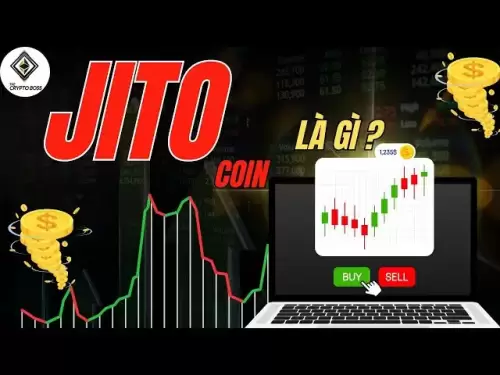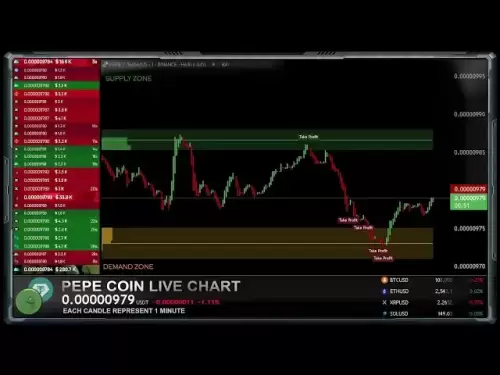-
 Bitcoin
Bitcoin $107,810.8710
-1.45% -
 Ethereum
Ethereum $2,531.4386
-1.75% -
 Tether USDt
Tether USDt $1.0000
-0.03% -
 XRP
XRP $2.2542
-0.99% -
 BNB
BNB $659.1350
-0.50% -
 Solana
Solana $148.5456
-2.40% -
 USDC
USDC $0.9999
-0.02% -
 TRON
TRON $0.2868
-0.44% -
 Dogecoin
Dogecoin $0.1666
-3.65% -
 Cardano
Cardano $0.5751
-2.36% -
 Hyperliquid
Hyperliquid $37.6845
-5.51% -
 Bitcoin Cash
Bitcoin Cash $494.9448
-0.65% -
 Sui
Sui $2.8396
-3.31% -
 Chainlink
Chainlink $13.2423
-2.59% -
 UNUS SED LEO
UNUS SED LEO $9.0482
0.02% -
 Stellar
Stellar $0.2467
-2.44% -
 Avalanche
Avalanche $17.8165
-3.63% -
 Shiba Inu
Shiba Inu $0.0...01158
-2.41% -
 Toncoin
Toncoin $2.7397
-3.42% -
 Hedera
Hedera $0.1560
-2.73% -
 Litecoin
Litecoin $85.8559
-2.34% -
 Monero
Monero $315.3710
-2.30% -
 Dai
Dai $1.0001
0.00% -
 Polkadot
Polkadot $3.3443
-2.03% -
 Ethena USDe
Ethena USDe $1.0001
0.01% -
 Bitget Token
Bitget Token $4.2888
-3.73% -
 Uniswap
Uniswap $7.3388
-1.57% -
 Aave
Aave $278.2986
-3.05% -
 Pepe
Pepe $0.0...09807
-3.67% -
 Pi
Pi $0.4563
-2.39%
What is the transaction fee for SOL?
SOL transaction fees include a base fee of 0.000005 SOL per signature and an optional priority fee, making total fees low compared to other blockchains like Ethereum.
Apr 22, 2025 at 11:00 am

What is the Transaction Fee for SOL?
The Solana (SOL) blockchain is known for its high throughput and low transaction fees, making it an attractive option for users and developers alike. Understanding the transaction fee structure for SOL is crucial for anyone looking to engage with the network. In this article, we will delve into the specifics of SOL transaction fees, how they are calculated, and what factors can affect them.
Understanding Solana's Transaction Fee Model
Solana's transaction fee model is designed to be simple yet effective. The primary components of a SOL transaction fee include the base fee and the priority fee. The base fee is a fixed amount that every transaction must pay to be processed on the network. The priority fee, on the other hand, is optional and can be adjusted by the user to prioritize their transaction over others.
Base Fee on Solana
The base fee on Solana is currently set at 0.000005 SOL per signature. This fee is charged for each signature included in a transaction. For example, a simple transfer of SOL from one wallet to another typically involves one signature, so the base fee would be 0.000005 SOL. If a transaction involves multiple signatures, such as in the case of a multi-signature wallet, the base fee will be multiplied accordingly.
Priority Fee on Solana
The priority fee is an additional amount that users can pay to increase the chances of their transaction being processed quickly. This fee is not fixed and can be set by the user. The higher the priority fee, the more likely it is that the transaction will be included in the next block. However, it's important to note that setting a priority fee is optional, and many transactions on the Solana network are processed without one.
Calculating Total Transaction Fees
To calculate the total transaction fee for a SOL transaction, you need to add the base fee and the priority fee. For example, if you are sending SOL and you decide to include a priority fee of 0.00001 SOL, the total transaction fee would be 0.000005 SOL (base fee) + 0.00001 SOL (priority fee) = 0.000015 SOL.
Factors Affecting SOL Transaction Fees
Several factors can influence the transaction fees on the Solana network. Network congestion is one of the primary factors. During periods of high network activity, users may need to increase their priority fees to ensure their transactions are processed promptly. The size of the transaction can also affect the fee, as larger transactions that involve more data may require additional signatures and thus higher base fees.
How to Set Transaction Fees on Solana
Setting transaction fees on Solana can be done through various wallets and platforms that support SOL transactions. Here’s a step-by-step guide on how to do it using the Phantom wallet, one of the most popular wallets for Solana:
- Open the Phantom wallet on your device.
- Select the 'Send' option to initiate a transaction.
- Enter the recipient’s address and the amount of SOL you wish to send.
- Click on the 'Advanced' tab to access the fee settings.
- Adjust the priority fee if you want to expedite your transaction. The default is usually set to 0, which means no priority fee.
- Review the total fee (base fee + priority fee) and confirm the transaction.
Comparing SOL Transaction Fees to Other Blockchains
When compared to other blockchains, Solana's transaction fees are notably low. For instance, Ethereum's gas fees can fluctuate significantly and often reach much higher levels, especially during network congestion. Bitcoin transaction fees can also be higher, particularly for faster processing times. Solana's design allows for a more predictable and generally lower fee structure, which is one of its key advantages.
Real-World Examples of SOL Transaction Fees
To provide a clearer picture, let's look at some real-world examples of SOL transaction fees. A simple transfer of SOL between two wallets typically incurs a fee of around 0.000005 SOL. If a user wants to expedite the transaction during a busy period, they might add a priority fee of 0.00001 SOL, making the total fee 0.000015 SOL. For more complex transactions, such as those involving smart contracts or multiple signatures, the fees can be slightly higher but still remain relatively low compared to other networks.
Frequently Asked Questions
Q: Can the base fee on Solana change over time?
A: Yes, the base fee on Solana can be adjusted by the network's developers if necessary. However, any changes would be communicated well in advance to the community to ensure transparency.
Q: Is it possible to send SOL without paying any fees?
A: No, every transaction on the Solana network requires at least the base fee of 0.000005 SOL per signature. The priority fee is optional, but the base fee is mandatory.
Q: How can I check the current transaction fees on Solana?
A: You can check the current transaction fees on Solana by using blockchain explorers like Solscan or by looking at the fee settings in your wallet, such as Phantom, before sending a transaction.
Q: Are there any tools to help estimate the best priority fee for my transaction?
A: Yes, some wallets and platforms provide tools to estimate the optimal priority fee based on current network conditions. For instance, Phantom wallet offers a fee estimator that suggests a priority fee based on the desired transaction speed.
Disclaimer:info@kdj.com
The information provided is not trading advice. kdj.com does not assume any responsibility for any investments made based on the information provided in this article. Cryptocurrencies are highly volatile and it is highly recommended that you invest with caution after thorough research!
If you believe that the content used on this website infringes your copyright, please contact us immediately (info@kdj.com) and we will delete it promptly.
- XLM Price Prediction: Is Stellar Ready for a Breakout?
- 2025-07-08 19:10:13
- Memecoin Mania: V2EX, Pump.fun, and the Wild West of Crypto
- 2025-07-08 19:50:12
- Dogecoin, Shiba Inu, Little Pepe: Meme Coin Mania or Future Finance?
- 2025-07-08 19:50:12
- Iron Maiden's 50th Anniversary: A Royal Mint Tribute in Metal!
- 2025-07-08 19:55:12
- DAI Stablecoin: Your Ace in the Hole for Online Casinos and Gambling Sites?
- 2025-07-08 19:55:12
- Token Investment in Q4 2025: Riding the Little Pepe Wave to 100x Gains?
- 2025-07-08 20:00:11
Related knowledge

How to customize USDT TRC20 mining fees? Flexible adjustment tutorial
Jun 13,2025 at 01:42am
Understanding USDT TRC20 Mining FeesMining fees on the TRON (TRC20) network are essential for processing transactions. Unlike Bitcoin or Ethereum, where miners directly validate transactions, TRON uses a delegated proof-of-stake (DPoS) mechanism. However, users still need to pay bandwidth and energy fees, which are collectively referred to as 'mining fe...

USDT TRC20 transaction is stuck? Solution summary
Jun 14,2025 at 11:15pm
Understanding USDT TRC20 TransactionsWhen users mention that a USDT TRC20 transaction is stuck, they typically refer to a situation where the transfer of Tether (USDT) on the TRON blockchain has not been confirmed for an extended period. This issue may arise due to various reasons such as network congestion, insufficient transaction fees, or wallet-rela...

How to cancel USDT TRC20 unconfirmed transactions? Operation guide
Jun 13,2025 at 11:01pm
Understanding USDT TRC20 Unconfirmed TransactionsWhen dealing with USDT TRC20 transactions, it’s crucial to understand what an unconfirmed transaction means. An unconfirmed transaction is one that has been broadcasted to the blockchain network but hasn’t yet been included in a block. This typically occurs due to low transaction fees or network congestio...

How to check USDT TRC20 balance? Introduction to multiple query methods
Jun 21,2025 at 02:42am
Understanding USDT TRC20 and Its ImportanceUSDT (Tether) is one of the most widely used stablecoins in the cryptocurrency market. It exists on multiple blockchain networks, including TRC20, which operates on the Tron (TRX) network. Checking your USDT TRC20 balance accurately is crucial for users who hold or transact with this asset. Whether you're sendi...

What to do if USDT TRC20 transfers are congested? Speed up trading skills
Jun 13,2025 at 09:56am
Understanding USDT TRC20 Transfer CongestionWhen transferring USDT TRC20, users may occasionally experience delays or congestion. This typically occurs due to network overload on the TRON blockchain, which hosts the TRC20 version of Tether. Unlike the ERC20 variant (which runs on Ethereum), TRC20 transactions are generally faster and cheaper, but during...

The relationship between USDT TRC20 and TRON chain: technical background analysis
Jun 12,2025 at 01:28pm
What is USDT TRC20?USDT TRC20 refers to the Tether (USDT) token issued on the TRON blockchain using the TRC-20 standard. Unlike the more commonly known ERC-20 version of USDT (which runs on Ethereum), the TRC-20 variant leverages the TRON network's infrastructure for faster and cheaper transactions. The emergence of this version came as part of Tether’s...

How to customize USDT TRC20 mining fees? Flexible adjustment tutorial
Jun 13,2025 at 01:42am
Understanding USDT TRC20 Mining FeesMining fees on the TRON (TRC20) network are essential for processing transactions. Unlike Bitcoin or Ethereum, where miners directly validate transactions, TRON uses a delegated proof-of-stake (DPoS) mechanism. However, users still need to pay bandwidth and energy fees, which are collectively referred to as 'mining fe...

USDT TRC20 transaction is stuck? Solution summary
Jun 14,2025 at 11:15pm
Understanding USDT TRC20 TransactionsWhen users mention that a USDT TRC20 transaction is stuck, they typically refer to a situation where the transfer of Tether (USDT) on the TRON blockchain has not been confirmed for an extended period. This issue may arise due to various reasons such as network congestion, insufficient transaction fees, or wallet-rela...

How to cancel USDT TRC20 unconfirmed transactions? Operation guide
Jun 13,2025 at 11:01pm
Understanding USDT TRC20 Unconfirmed TransactionsWhen dealing with USDT TRC20 transactions, it’s crucial to understand what an unconfirmed transaction means. An unconfirmed transaction is one that has been broadcasted to the blockchain network but hasn’t yet been included in a block. This typically occurs due to low transaction fees or network congestio...

How to check USDT TRC20 balance? Introduction to multiple query methods
Jun 21,2025 at 02:42am
Understanding USDT TRC20 and Its ImportanceUSDT (Tether) is one of the most widely used stablecoins in the cryptocurrency market. It exists on multiple blockchain networks, including TRC20, which operates on the Tron (TRX) network. Checking your USDT TRC20 balance accurately is crucial for users who hold or transact with this asset. Whether you're sendi...

What to do if USDT TRC20 transfers are congested? Speed up trading skills
Jun 13,2025 at 09:56am
Understanding USDT TRC20 Transfer CongestionWhen transferring USDT TRC20, users may occasionally experience delays or congestion. This typically occurs due to network overload on the TRON blockchain, which hosts the TRC20 version of Tether. Unlike the ERC20 variant (which runs on Ethereum), TRC20 transactions are generally faster and cheaper, but during...

The relationship between USDT TRC20 and TRON chain: technical background analysis
Jun 12,2025 at 01:28pm
What is USDT TRC20?USDT TRC20 refers to the Tether (USDT) token issued on the TRON blockchain using the TRC-20 standard. Unlike the more commonly known ERC-20 version of USDT (which runs on Ethereum), the TRC-20 variant leverages the TRON network's infrastructure for faster and cheaper transactions. The emergence of this version came as part of Tether’s...
See all articles

























































































